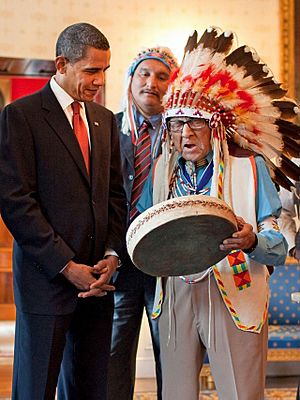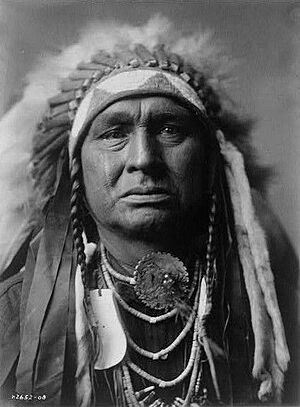Joe Medicine Crow facts for kids
Quick facts for kids
Joe Medicine Crow
|
|
|---|---|

With President Barack Obama in 2009
|
|
| Born |
Joseph Medicine Crow
October 27, 1913 Near Lodge Grass, Montana, U.S.
|
| Died | April 3, 2016 (aged 102) Billings, Montana, U.S.
|
| Nationality | Crow, American |
| Alma mater | Linfield College University of Southern California |
| Occupation | Historian, war chief, anthropologist, author |
| Relatives | Pauline Small (cousin) White Man Runs Him (step-grandfather) |
| Awards | |
| Military career | |
| Allegiance | |
| Service/ |
|
| Years of service | 1943–1946 |
| Rank | |
| Unit | 103rd Infantry Division |
| Battles/wars | World War II |
| Awards | |
Joseph Medicine Crow (born October 27, 1913 – died April 3, 2016) was a famous Native American writer and historian. He was also a war chief of the Crow Nation. He wrote many important books about Native American history and culture. He was especially known for his work on the Battle of the Little Bighorn from 1876.
Medicine Crow was a brave soldier in World War II. He served as a scout in the U.S. Army's 103rd Infantry Division. He received the Bronze Star Medal and the Légion d'honneur for his service. In 2009, he was given the Presidential Medal of Freedom by President Barack Obama. This is one of the highest awards a civilian can get in the United States.
He was also a founder of the Traditional Circle of Indian Elders and Youth. Joseph Medicine Crow was the very last war chief of the Crow Nation. He was also the last Plains Indian war chief.
Contents
Growing Up in the Crow Nation
Joseph Medicine Crow was born in 1913. His Crow name meant "High Bird." He was born on the Crow Indian Reservation near Lodge Grass, Montana. His parents were Amy Yellowtail and Leo Medicine Crow.
In the Crow culture, children were part of their mother's family. This meant Joseph got his social standing from his mother's side. Important things like property and special positions were passed down through the mother's family.
His grandfather, Chief Medicine Crow, was a very respected war chief. He became a war chief at only 22 years old. He was a great example for young warriors and inspired his grandson, Joseph.

Joseph's maternal step-grandfather was White Man Runs Him. He was a scout for U.S. General George Armstrong Custer. He saw the Battle of the Little Bighorn in 1876 with his own eyes. Joseph Medicine Crow's cousin was Pauline Small. She was the first woman elected to office in the Crow Tribe of Indians.
His Journey in Education
When Joseph was young, he heard stories about the Battle of the Little Bighorn. His step-grandfather, White Man Runs Him, told him these stories directly. White Man Runs Him had been a scout for General George Armstrong Custer.
In 1929, Joseph started attending Bacone College in Muskogee, Oklahoma. He earned an Associate of Arts degree there in 1936. He then went to Linfield College and got his bachelor's degree in sociology and psychology in 1938.
He continued his studies at the University of Southern California in Los Angeles. In 1939, he earned a master's degree in anthropology. He was the first person from the Crow tribe to get a master's degree. His master's paper was about how European culture affected the Crow Indians. This paper became a very important work about Crow culture. He started working on his doctorate degree, but he had to stop when the United States entered World War II.
In 1941, Medicine Crow taught at Chemawa Indian School for a year. After that, he worked in shipyards in Bremerton, Washington in 1942.
Serving in World War II
After working in the shipyards, Joseph Medicine Crow joined the U.S. Army in 1943. He became a scout in the 103rd Infantry Division. He fought bravely in World War II.
Before going into battle, he would put on his traditional war paint. He drew two red stripes on his arms under his uniform. He also carried a special yellow eagle feather, given to him by a "sundance" medicine man. He kept this feather under his helmet for good luck and protection.
One amazing story from his service is when he led a successful war party. He managed to steal fifty horses from a German camp. These horses belonged to the Waffen SS. As he rode away with the horses, he sang a traditional Crow honor song.
Joseph Medicine Crow was the last person from the Crow tribe to become a war chief. He was interviewed for a 2007 PBS series called The War. In it, he shared his experiences from World War II. The filmmaker, Ken Burns, said he had wanted to tell Joseph's story for 20 years.
A Voice for His People
After his time in the Army, Medicine Crow went back to the Crow Agency. In 1948, he was named the official historian and anthropologist for his tribe. He started working for the Bureau of Indian Affairs (BIA) in 1951. He also served on the Crow Central Education Commission for many years. In 1999, he even spoke at the United Nations.
Medicine Crow often gave talks at Little Big Horn College. He also spoke at the Little Big Horn Battlefield Museum. He appeared in many documentaries about the Battle of the Little Bighorn. This was because his family had passed down stories about the battle for generations. He even wrote a script for the reenactment of the battle. This reenactment has been held every summer in Hardin since 1965.
He was a founding member of Little Bighorn College. He also helped start the Buffalo Bill Historical Center in Cody, Wyoming in 1976.
As the tribal historian, Joseph Medicine Crow was like the "keeper of memories" for his tribe. He carefully saved stories and photos of his people. He wrote several books, including Crow Migration Story and From the Heart of Crow Country. He also wrote a book for children called Brave Wolf and the Thunderbird.
Later Life and Passing
Joseph Medicine Crow continued to write and give lectures. He spoke at universities and other places until he passed away. He was 102 years old when he died on April 3, 2016. He was in hospice care in Billings, Montana. He is remembered by his son, Ron Medicine Crow, his daughters, Vernelle Medicine Crow and Diane Reynolds, and his stepdaughter, Garnet Watan.
Honors and Awards
Joseph Medicine Crow received many special honors during his life.
- He received honorary doctorates from several colleges. These included Rocky Mountain College in 1999, the University of Southern California in 2003, and Bacone College in 2010. He was an ambassador and speaker at Bacone College for over 50 years.
- His book, Counting Coup: Becoming a Crow Chief on the Reservation and Beyond, was recognized in 2007. The National Council for the Social Studies chose it as a "Notable Tradebook for Young People."
- On June 25, 2008, he received two military awards. These were the Bronze Star for his service in the U.S. Army and the French Legion of Honor Chevalier medal. Both were for his brave actions during World War II.
- His other military awards included the Combat Infantryman Badge, the Army Good Conduct Medal, the American Campaign Medal, the European-African-Middle Eastern Campaign Medal, and the World War II Victory Medal.
- On August 12, 2009, President Barack Obama gave him the Presidential Medal of Freedom. This is the highest award a civilian can receive in the United States. During the ceremony, Obama called him bacheitche, which means "a good man" in the Crow language.
Decorations
 |
||
| Combat Infantryman Badge | ||||||||||||||||||||||||||||
| 1st Row | Bronze Star Medal | |||||||||||||||||||||||||||
|---|---|---|---|---|---|---|---|---|---|---|---|---|---|---|---|---|---|---|---|---|---|---|---|---|---|---|---|---|
| 2nd Row | Army Good Conduct Medal | Presidential Medal of Freedom | American Campaign Medal | |||||||||||||||||||||||||
| 3rd Row | European-African-Middle Eastern Campaign Medal | World War II Victory Medal | Knight Legion of Honour (France) |
|||||||||||||||||||||||||
See also
 In Spanish: Joe Medicine Crow para niños
In Spanish: Joe Medicine Crow para niños

